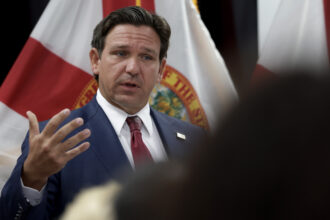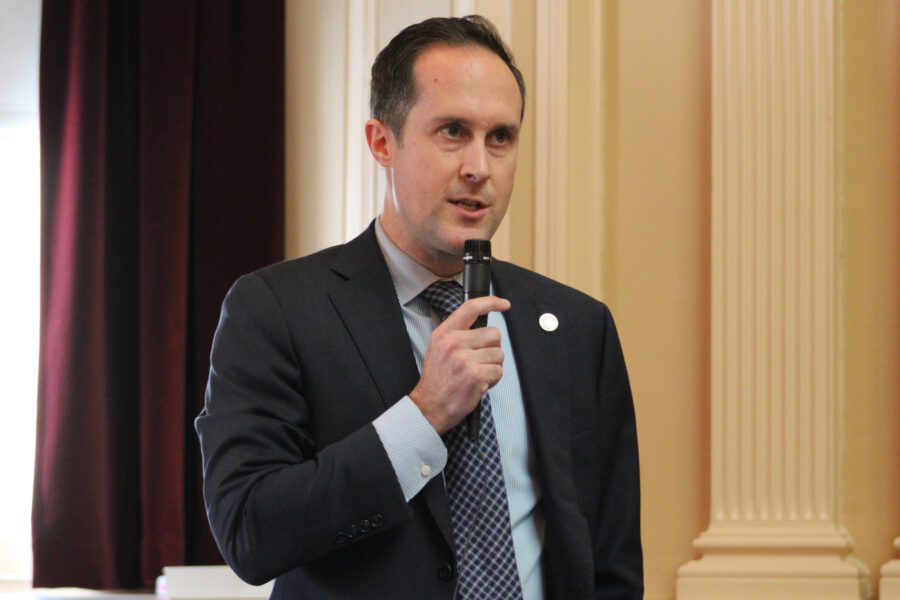A letter being circulated on Capitol Hill by a key Congressional ally of Donald Trump and the fossil fuel industry argues that the United States should stay in the Paris climate agreement—but on some starkly different terms.
In the letter, Rep. Kevin Cramer, (R-N.D.) said the United States should not flatly renounce the global agreement, but should walk back its pledge to cut greenhouse gas emissions to something less ambitious. He also said the U.S. should stop aid payments to the UN’s main climate action fund altogether.
That would mean abandoning key promises while attempting to retain influence over future climate actions. It plainly puts the fossil fuel agenda first and relinquishes U.S. leadership toward the treaty’s underlying goal of eliminating emissions of carbon dioxide from the use of fossil fuels within a few decades.
President Obama pledged to make a 26 to 28 percent reduction in greenhouse gas emissions by 2025, compared to a 2005 baseline. And in follow-up talks, Obama’s negotiators agreed that the cuts would have to be even deeper by mid-century.
“This target would cause irreparable harm to our economy, particularly our manufacturing and energy sectors, and should be rejected,” Cramer claimed in the letter.
Instead, Cramer wrote, the president should come up with a new pledge. “We should showcase the energy security, consumer, and emission benefits produced by the shale revolution,” he said, adding the country should emphasize clean coal and nuclear technologies, among other things. Ultimately, the new pledge should help ensure the future of fossil fuels, he wrote.
The letter overlooks one key part of the Paris agreement, though: not only are countries prohibited from backsliding in their ambition, they are required to ratchet up those ambitions.
Cramer was an early Trump supporter during the presidential campaign and played a key role in helping shape Trump’s energy policy. That policy strongly favors fossil fuels, pledges to revive the U.S. coal industry, and rejects the Obama administration’s plans to meet its current pledges.
Trump tapped Cramer last May to write a white paper on energy policy, and Cramer was considered for the energy secretary position that ultimately went to former Texas Gov. Rick Perry.
In his letter to Trump, Cramer cited a report written by George David Banks, then the executive vice president of the American Council for Capital Formation. At the end of February, Banks was made special assistant to the president for international energy and environment, putting him in a key spot to influence climate talks—second only, perhaps, to Exxon’s former chief executive, Rex Tillerson, now secretary of state.
The industry-funded group’s report claimed that achieving the greenhouse gas emissions cuts envisioned by Obama would reduce the U.S. gross domestic product by $250 billion by 2025 and cause millions of job losses.
Many other analyses contradict that gloomy point of view. Already, wind and solar investment in the United States is booming, along with jobs in clean energy. And one recent study projected that worldwide, the shift to green energy under the impetus of the Paris goals would add $19 trillion to world economic output by 2050, creating millions of jobs.
“Job losses in fossil fuel industry would be fully offset by new jobs in renewables, with more jobs being created by energy efficiency activities,” said the report, jointly issued by the authoritative International Energy Agency and by IRENA, the International Renewable Energy Association, which represents global clean energy interests.
On the Green Climate Fund—which will help developing nations prepare for climate impacts—Cramer said the U.S. should stop payments. So far, the country has put $1 billion into the fund, $2 billion short of its pledge. Half of the contributions to date were provided pre-emptively by the Obama administration shortly before Trump took office.
Those payments, Cramer said, are enough, and earn the United States a role dictating how the rest of the fund is spent. “We should use our power to veto any projects deemed wasteful and harmful to global energy security efforts and poverty eradication objectives in the developing world,” he wrote.
The president’s initial, sketchy budget blueprint, released on March 16, argued for the same thing, in addition to essentially defunding all international climate work.
Notably, Cramer did not ask that the Paris agreement be sent to the Senate for approval—a request that has been made by others who wish to see the United States leave the treaty. But his suggested changes to the United States’ climate pledge—encouraging more fossil fuel development instead of shifting to clean energy—leave little resemblance to the original intent of the treaty, either.
“The U.S. should use its seat at the Paris table to defend and promote our commercial interests, including our manufacturing and fossil fuel sectors,” Cramer wrote.
About This Story
Perhaps you noticed: This story, like all the news we publish, is free to read. That’s because Inside Climate News is a 501c3 nonprofit organization. We do not charge a subscription fee, lock our news behind a paywall, or clutter our website with ads. We make our news on climate and the environment freely available to you and anyone who wants it.
That’s not all. We also share our news for free with scores of other media organizations around the country. Many of them can’t afford to do environmental journalism of their own. We’ve built bureaus from coast to coast to report local stories, collaborate with local newsrooms and co-publish articles so that this vital work is shared as widely as possible.
Two of us launched ICN in 2007. Six years later we earned a Pulitzer Prize for National Reporting, and now we run the oldest and largest dedicated climate newsroom in the nation. We tell the story in all its complexity. We hold polluters accountable. We expose environmental injustice. We debunk misinformation. We scrutinize solutions and inspire action.
Donations from readers like you fund every aspect of what we do. If you don’t already, will you support our ongoing work, our reporting on the biggest crisis facing our planet, and help us reach even more readers in more places?
Please take a moment to make a tax-deductible donation. Every one of them makes a difference.
Thank you,













